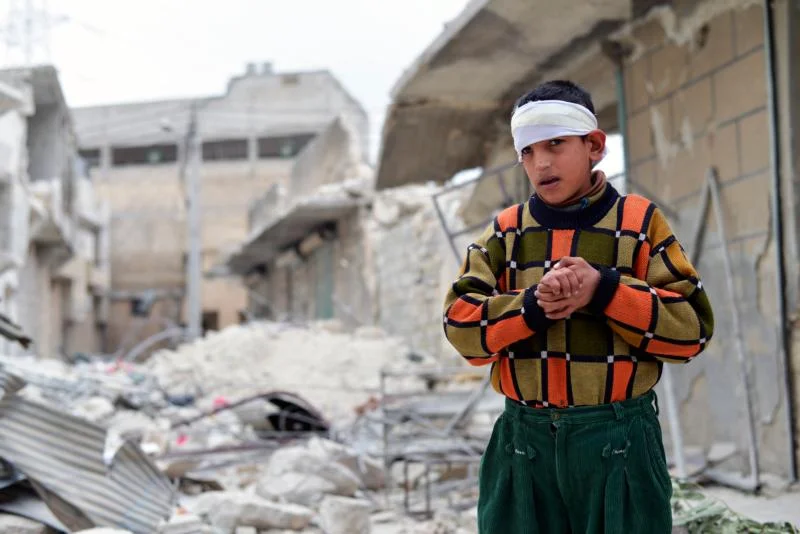
An injured boy stands amid rubble outside his home in 2014 after airstrikes in Aleppo, Syria. The Melkite Catholic archbishop of Aleppo has asked for support for his war-torn city and thanked the Knights of Columbus and other organizations for speaking out about the genocide of Syrian Christians and other religious minorities. (CNS photo/Ali Mustafa, EPA)
by Mary Chalupski
NEW HAVEN, Conn. (CNS) — The Melkite Catholic archbishop of Aleppo, Syria, has asked for support for his war-torn city and thanked the Knights of Columbus and other organizations for speaking out about the genocide of Syrian Christians and other religious minorities.
Speaking May 2 with a heavy but hopeful heart at a news conference at the Knights’ headquarters, Archbishop Jean-Clement Jeanbart recounted five years of destruction by the Islamic State group and anti-government rebels that has resulted in thousands of deaths, continued attacks on Christians and the destruction of homes, hospitals, businesses and churches in the ancient city.
“When I see what we have lost, you can be sure that I cry in my heart,” the archbishop said.
Concurrent with his visit, the United States was calling for an end to the bloodshed in Syria as negotiations continued in Geneva to end the fighting and Secretary of State John Kerry was discussing proposals to restore at least a partial truce among the warring factions.
Despite the atrocities of the civil war that has caused thousands of Christians to flee to the Syrian capital of Damascus, the port city of Latakia and surrounding countries, the archbishop said that signs of hope were raised during Holy Week when an estimated 3,000 people attended the Palm Sunday liturgy.
“I think this day came as a great comfort to the people,” he said.
“We were afraid that we were down to 25 percent” of Christians previously living in Aleppo, Archbishop Jeanbart said. But to people’s surprise, he noted, the crowds that came for the Palm Sunday and Easter liturgies indicated that about half of the previously estimated 170,000 Christians in Aleppo still remain or have returned.
The strength of the crowds “has given us hope that the future could be good again and we’ll have good people working for a new church rising up,” he said.
The archbishop was in New Haven as part of a visit to North America to raise awareness of the plight of Syrian Christians, raise funds for the relief effort and to thank the Knights for its support.
After stops in Montreal, Boston and Washington, he attended a conference at the United Nations in New York April 28 with Carl Anderson, Knights CEO. Notably, the Knights were instrumental in urging a declaration of genocide by the U.S. Department of State that came from Kerry March 17. The Knights and In Defense of Christians released an extensive report a week earlier that chronicled evidence of targeted destruction, Christian persecution, killings, torture, rape and enslavement.
Anderson explained that the declaration will allow for the investigation and prosecution of war crimes and boost humanitarian relief.
Archbishop Jeanbart, who called the actions against religious minorities in Syria “evil,” described the rich culture, tradition and economic foundation that Aleppo enjoyed before the devastating civil war began in 2011. With an 8,000-year history, Aleppo is both the largest city in Syria and home to one of the largest Christian populations in the Middle East.
He noted that while the focus of international aid programs is on refugees, millions of whom have fled to Turkey, Lebanon and Jordan in the hope of landing in other countries, there are fewer programs available for residents who remain in war-torn communities.
To encourage residents to stay in Aleppo, he launched his own “Build to Stay” initiative that currently consists of 16 programs to benefit small businesses and repair homes damaged in the war.
Putting his own spin on the effort, the prelate announced that he is informally “adopting” children born in 2015 and 2016 to encourage couples to have children.
“So far, I have 75 children,” he said. “I have been able to sponsor them and give scholarships to 1,100 students so they can continue to go to school” with funds provided by international donors.
To further support Christians and people of other minority religions in Iraq and Syria, the Knights has raised $10.5 million for its Christian Refugee Relief Fund since 2014 to provide housing, food, medical aid, education and other assistance.
“As you can see, the need is great,” Anderson said. “What we have to ask ourselves is, are we willing to allow these communities which go back to the time of Christ and the time of the Apostle Paul to … be eliminated. I hate to use the phrase ‘final solution’ of the Christian communities of the Middle East, but that may be what we are facing here.
“This is not a struggle between Christianity and Islam,” he added. “It is a struggle between humanity and the enemies of humanity. So we can’t make this a sectarian issue.”
“The most vulnerable communities in this region are the small Christian communities, the Yazidi communities, the Turkmen communities, and we have to make an extra effort to protect them.”






